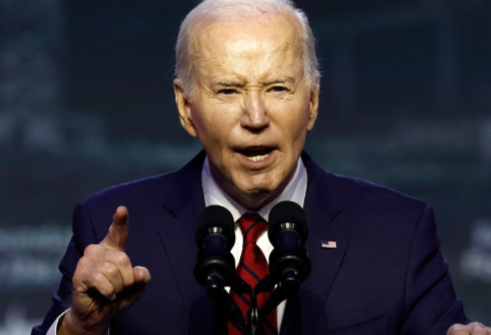Biden Calls for Record-High Taxes ... We're Closing in on a 50% Rate

It feels like a distant memory to engage in a traditional tax debate, and it's no surprise.
With the federal government dominated by the establishment and controlled by the deep state, taxing future generations to fund perpetual foreign wars, imposing experimental medical treatments under emergency use approvals, censoring online speech, and arresting political adversaries, there have been more pressing issues at hand.
However, President Joe Biden's proposed fiscal year 2025 budget has brought back the prospect of a historic high top capital gains and qualified dividends tax rate of 44.6 percent, sparking a classic clash between opponents with conservative or libertarian views who oppose the proposed increase and academic liberals advocating for billionaires to pay their "fair share."
Americans who lived through the 1980s can sympathize with those who did not, as Biden's budget seems to transport us back to that era.
On the conservative-libertarian side, John Kartch of Americans for Tax Reform strongly criticized the proposed tax hike, noting that it would raise the top rate to its highest level since the introduction of the capital gains tax in 1922. He also highlighted the burden imposed by state capital gains taxes, which, combined with the federal increase, could exceed 50% in many states.
Furthermore, Kartch pointed out how the tax hike could impact hardworking couples who built a small business over decades, potentially facing a 44.6% top rate plus state taxes on gains that may not reflect real value due to inflation.
On the opposing side, Forbes contributor Andrew Leahey, an attorney and professor, downplayed the significance of the proposed tax increase for most Americans. He noted that the 44.6% rate would only affect individuals with taxable income above $1 million and investment income above $400,000, framing it as a measure to ensure high earners contribute proportionally to their financial activities.
Leahey also mentioned that American billionaires already pay a relatively low income-tax rate, suggesting they are less deserving of sympathy from average taxpayers.
The debate, however, goes beyond whether billionaires deserve empathy and delves into the kind of government citizens are willing to accept. The concentration of wealth in certain areas, like suburbs of Washington, D.C., raises questions about wealth confiscation and its consequences.
Moreover, historical perspectives on taxation and representation remind us that taxation alone was not the primary concern of America's founders. They fought against tyrannical taxation aimed at undermining liberty, a sentiment echoed by figures like John Adams and Thomas Jefferson in their denunciations of oppressive tax schemes and government overreach.
In the 21st century, Americans could benefit from a similar steadfast opposition to prevent their government from becoming tyrannical.